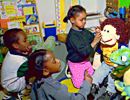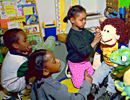Under the New Zealand Sun: Celebrating Leadership, Fidelity, & Friendship

Check out our blog for social-emotional learning articles, news, and more!

 Early-onset conduct problems predict antisocial and criminal behaviour in adolescence and adulthood, including violent offending, and these problems occur with greater frequency in disadvantaged communities. Parenting is implicated in the development and maintenance of these problems. To address them the government in England and Wales is funding Sure Start services, but so far it has not specified that evidence-based programmes should be delivered. Sure Start areas were targeted to provide services for high-risk families in disadvantaged areas. Certain family characteristics such as low income, low education level, isolation, teenage pregnancy, high stress levels, single parenthood (or high levels of marital discord), depression, parental psychiatric illness or criminal history, and inconsistent, or harsh, parenting practices put children at high risk of developing conduct disorder and perpetuating particular family characteristics. Within disadvantaged areas there is considerable variation in crime levels. The purpose of this paper is to establish whether crime rates predict outcomes from a parenting intervention, the Webster-Stratton Incredible Years (IY) BASIC Parenting Programme, delivered in 11 Sure Start areas across north and mid-Wales. Parent participation in the programme demonstrated significant improvements in both child and parent behaviour. The current paper reports on the analysis of the effect of community crime levels on outcome. Regression analyses showed that crime rates were not predictive of outcome: the BASIC programme is effective in areas with both higher and lower crime levels..
Early-onset conduct problems predict antisocial and criminal behaviour in adolescence and adulthood, including violent offending, and these problems occur with greater frequency in disadvantaged communities. Parenting is implicated in the development and maintenance of these problems. To address them the government in England and Wales is funding Sure Start services, but so far it has not specified that evidence-based programmes should be delivered. Sure Start areas were targeted to provide services for high-risk families in disadvantaged areas. Certain family characteristics such as low income, low education level, isolation, teenage pregnancy, high stress levels, single parenthood (or high levels of marital discord), depression, parental psychiatric illness or criminal history, and inconsistent, or harsh, parenting practices put children at high risk of developing conduct disorder and perpetuating particular family characteristics. Within disadvantaged areas there is considerable variation in crime levels. The purpose of this paper is to establish whether crime rates predict outcomes from a parenting intervention, the Webster-Stratton Incredible Years (IY) BASIC Parenting Programme, delivered in 11 Sure Start areas across north and mid-Wales. Parent participation in the programme demonstrated significant improvements in both child and parent behaviour. The current paper reports on the analysis of the effect of community crime levels on outcome. Regression analyses showed that crime rates were not predictive of outcome: the BASIC programme is effective in areas with both higher and lower crime levels..





